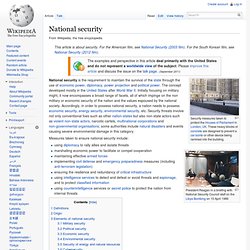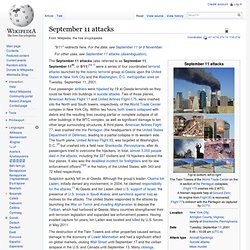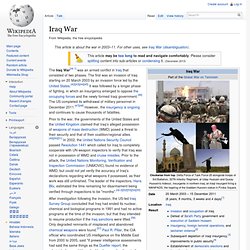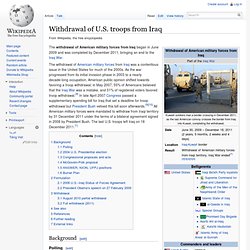

National Security. President Reagan in a briefing with National Security Council staff on the Libya Bombing on 15 April 1986 Measures taken to ensure national security include: using diplomacy to rally allies and isolate threatsmarshalling economic power to facilitate or compel cooperationmaintaining effective armed forcesimplementing civil defense and emergency preparedness measures (including anti-terrorism legislation)ensuring the resilience and redundancy of critical infrastructureusing intelligence services to detect and defeat or avoid threats and espionage, and to protect classified informationusing counterintelligence services or secret police to protect the nation from internal threats Definitions[edit] There is no single universally accepted definition of national security.

The variety of definitions provide an overview of the many usages of this concept. "The distinctive meaning of national security means freedom from foreign dictation. " Origin[edit] Elements of national security[edit] China[edit] September 11 attacks. The September 11 attacks (also referred to as September 11, September 11th, or 9/11)[nb 1] were a series of four coordinated terrorist attacks launched by the Islamic terrorist group al-Qaeda upon the United States in New York City and the Washington, D.C. metropolitan area on Tuesday, September 11, 2001.

Four passenger airliners were hijacked by 19 al-Qaeda terrorists so they could be flown into buildings in suicide attacks. Two of those planes, American Airlines Flight 11 and United Airlines Flight 175, were crashed into the North and South towers, respectively, of the World Trade Center complex in New York City. Within two hours, both towers collapsed with debris and the resulting fires causing partial or complete collapse of all other buildings in the WTC complex, as well as significant damage to ten other large surrounding structures.
Background Attackers al-Qaeda The origins of al-Qaeda can be traced to 1979 when the Soviet Union invaded Afghanistan. Osama bin Laden Motives Attacks. Iraq War. Prior to the war, the governments of the United States and the United Kingdom claimed that Iraq's alleged possession of weapons of mass destruction (WMD) posed a threat to their security and that of their coalition/regional allies.[49][50][51] In 2002, the United Nations Security Council passed Resolution 1441 which called for Iraq to completely cooperate with UN weapon inspectors to verify that Iraq was not in possession of WMD and cruise missiles.

Prior to the attack, the United Nations Monitoring, Verification and Inspection Commission (UNMOVIC) found no evidence of WMD, but could not yet verify the accuracy of Iraq's declarations regarding what weapons it possessed, as their work was still unfinished. The leader of the inspectors, Hans Blix, estimated the time remaining for disarmament being verified through inspections to be "months".
[nb 2][52][53][54][55] Background[edit] Iraq disarmament and pre-war intelligence[edit] UN weapons inspections resume[edit] Yellowcake uranium[edit] Withdrawal from Iraq. The withdrawal of American military forces from Iraq began in June 2009 and was completed by December 2011, bringing an end to the Iraq War.

The withdrawal of American military forces from Iraq was a contentious issue in the United States for much of the 2000s. As the war progressed from its initial invasion phase in 2003 to a nearly decade-long occupation, American public opinion shifted towards favoring a troop withdrawal; in May 2007, 55% of Americans believed that the Iraq War was a mistake, and 51% of registered voters favored troop withdrawal.[8] In late April 2007 Congress passed a supplementary spending bill for Iraq that set a deadline for troop withdrawal but President Bush vetoed this bill soon afterwards.[9][10] All American military forces were mandated to withdraw from Iraqi territory by 31 December 2011 under the terms of a bilateral agreement signed in 2008 by President Bush.
The last U.S. troops left Iraq on 18 December 2011.[1] Background[edit] Polling[edit] 2004 U.S.